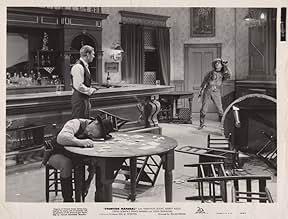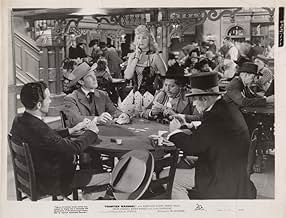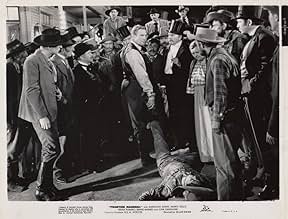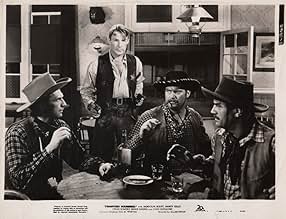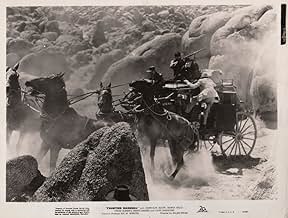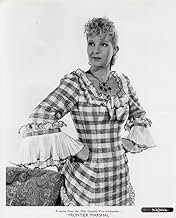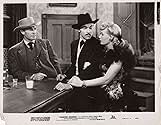VALUTAZIONE IMDb
6,6/10
1119
LA TUA VALUTAZIONE
Aggiungi una trama nella tua linguaWyatt Earp agrees to become marshal and establish order in Tombstone in this very romanticized version of the gunfight at the O.K. Corral.Wyatt Earp agrees to become marshal and establish order in Tombstone in this very romanticized version of the gunfight at the O.K. Corral.Wyatt Earp agrees to become marshal and establish order in Tombstone in this very romanticized version of the gunfight at the O.K. Corral.
- Premi
- 1 vittoria in totale
Dell Henderson
- Dave Hall
- (as Del Henderson)
Eddie Dunn
- Card Player
- (scene tagliate)
Recensioni in evidenza
This was the movie which John Ford remade as his classic My Darling Clementine. Here, Randolph Scott plays Wyatt Earp and Caesar Romero plays Doc Holiday, but there are no Clantons or Earp brothers. Instead, John Carradine plays a bad saloon owner heading a gang that is trying to take over Tombstone.
Of course, this movie can't directly compare to My Darling Clementine, but it's a pretty good western in its own right. Its one of Randolph Scott's better early roles.
Many of the classic scenes in My Darling Clementine were taken directly from this movie, and it's very interesting to compare the two. This version of Frontier Marshal was a remake of an earlier 1933 version, and, of course, this story has been told many times since.
The Maltin Guide gives it three stars. Check it out if you're a western fan, or just a fan of My Darling Clementine.
Of course, this movie can't directly compare to My Darling Clementine, but it's a pretty good western in its own right. Its one of Randolph Scott's better early roles.
Many of the classic scenes in My Darling Clementine were taken directly from this movie, and it's very interesting to compare the two. This version of Frontier Marshal was a remake of an earlier 1933 version, and, of course, this story has been told many times since.
The Maltin Guide gives it three stars. Check it out if you're a western fan, or just a fan of My Darling Clementine.
Randolph Scott, as Wyatt Earp, rides into Tombstone thinking about starting a stagecoach line. But Indian Charlie, drunk, starts shooting up the local saloon. The local marshal (Ward Bond) is afraid to go in and roust Charlie, so Earp dons a badge, goes in and drags him out by the feet. Earp becomes the full-time marshal. He meets Doc Halliday (Caesar Romero), a tubercular physician, gambler, and gunman, and after an initial wary brush, the two become more or less friends. Romero has a local trashy girlfriend (Binnie Barnes) whom Scott has to dump in a water trough. Doc gets liquored up, pulls his gun at the bar, and Earp knocks him out to save his life. An old flame of Doc's (Nancy Kelly) shows up in town, having pursued Doc all across the West, but Doc dumps her unceremoniously because he loathes what he's become. He redeems himself, however, by saving a badly wounded patient, only to be killed by Curly Bill and his gang as he walks out of the saloon door. There follows a shootout at the OK Corral in which Scott makes mincemeat of the bad guys. Binnie Barnes leaves town on the stage, and Kelly stays behind, probably not unaware of the moon eyes Scott has been casting her way.
Sound at all familiar? Seven years later it was remade as John Ford's "My Darling Clementine."
It isn't a bad movie, better than the majority of Westerns being made at the time. Yet one can't help wondering what makes Allan Dwan's "Frontier Marshal" an above-average Western and Ford's "My Darling Clementine" a classic.
Small things first. Dwan's movie is short on creativity in the wardrobe and makeup departments. Like most of the other principals, Scott dresses in an echt-1939 suit, only with a cowboy hat and gunbelt. The women's makeup dates badly, with dos out of the late 1930s and pencilled eyebrows and big lashes. It isn't that "Clementine" is extremely good in those respects -- it's just better.
The photography and location shooting don't reach the bar set by "Clementine" either. The photography isn't bad at all but it hardly fits into a Western frame. Almost the entire movie is shot at night, with no more than a handful of daylight scenes. The location isn't Monument Valley but it is, after all, Movie Flats which has been used expressively before. Here, it's not really present in any utilitarian sense because you can't SEE it at night.
Acting. Caesar Romero is probably as good as Victor Mature was in the later version. Binnie Barnes and Linda Darnell (in the same hooker role) are equally good, although they give us two quite different versions of what a hooker is like. Barnes is older, tougher looking, a bit treacherous. Darnell is younger, more Hispanic, tousle-haired, tempestuous, and childish. Scott is a competent actor, but Fonda is on the other hand outstanding. Throughout "Clementine" Fonda wears an expression that has something of puzzlement in it. When he whacks a guy over the head with the barrel of his pistol, he looks up from the unconscious body as if he's slightly surprised at what has happened and hasn't got a very clear idea of what's going to take place next.
Above all, there is the difference in direction. Dwan was a forthright story teller, a pioneer in the movies, and he does a good job. But Ford goes beyond the story, almost into visual poetry. "Clementine" has not only the family, but two opposing families, which gives the characters added depth and more intense motives. "Clementine" also has the familiar Ford opposition between the wilderness and the garden, which in Dwan's film is given very short shrift indeed. There is nothing in "Frontier Marshal" like the scene in which Fonda escorts Cathy Downs to the half-built church and awkwardly dances with her. What a celebration of community. Dwan's story deals with individuals who have conflicting ideas of how to get ahead. A couple of people know one another but there is little sense of a "town" in Dwan's movie. I won't go on about Ford's touches of roughhouse humor except to mention that they add another element lacking in "Frontier Marshal." There's an intentionality behind these brief incidents. Instance Fonda's dance with his feet against the porch post, or Darnell throwing a pitcher of milk in Ward Bond's face after he whinnies at her.
Still -- allright, so it's not a classic. But "Frontier Marshal" is better than most. And it's worth seeing for its historical value, a kind of lesson about how to make a good movie into a very good movie indeed.
Sound at all familiar? Seven years later it was remade as John Ford's "My Darling Clementine."
It isn't a bad movie, better than the majority of Westerns being made at the time. Yet one can't help wondering what makes Allan Dwan's "Frontier Marshal" an above-average Western and Ford's "My Darling Clementine" a classic.
Small things first. Dwan's movie is short on creativity in the wardrobe and makeup departments. Like most of the other principals, Scott dresses in an echt-1939 suit, only with a cowboy hat and gunbelt. The women's makeup dates badly, with dos out of the late 1930s and pencilled eyebrows and big lashes. It isn't that "Clementine" is extremely good in those respects -- it's just better.
The photography and location shooting don't reach the bar set by "Clementine" either. The photography isn't bad at all but it hardly fits into a Western frame. Almost the entire movie is shot at night, with no more than a handful of daylight scenes. The location isn't Monument Valley but it is, after all, Movie Flats which has been used expressively before. Here, it's not really present in any utilitarian sense because you can't SEE it at night.
Acting. Caesar Romero is probably as good as Victor Mature was in the later version. Binnie Barnes and Linda Darnell (in the same hooker role) are equally good, although they give us two quite different versions of what a hooker is like. Barnes is older, tougher looking, a bit treacherous. Darnell is younger, more Hispanic, tousle-haired, tempestuous, and childish. Scott is a competent actor, but Fonda is on the other hand outstanding. Throughout "Clementine" Fonda wears an expression that has something of puzzlement in it. When he whacks a guy over the head with the barrel of his pistol, he looks up from the unconscious body as if he's slightly surprised at what has happened and hasn't got a very clear idea of what's going to take place next.
Above all, there is the difference in direction. Dwan was a forthright story teller, a pioneer in the movies, and he does a good job. But Ford goes beyond the story, almost into visual poetry. "Clementine" has not only the family, but two opposing families, which gives the characters added depth and more intense motives. "Clementine" also has the familiar Ford opposition between the wilderness and the garden, which in Dwan's film is given very short shrift indeed. There is nothing in "Frontier Marshal" like the scene in which Fonda escorts Cathy Downs to the half-built church and awkwardly dances with her. What a celebration of community. Dwan's story deals with individuals who have conflicting ideas of how to get ahead. A couple of people know one another but there is little sense of a "town" in Dwan's movie. I won't go on about Ford's touches of roughhouse humor except to mention that they add another element lacking in "Frontier Marshal." There's an intentionality behind these brief incidents. Instance Fonda's dance with his feet against the porch post, or Darnell throwing a pitcher of milk in Ward Bond's face after he whinnies at her.
Still -- allright, so it's not a classic. But "Frontier Marshal" is better than most. And it's worth seeing for its historical value, a kind of lesson about how to make a good movie into a very good movie indeed.
Yes, yes, I know. My Darling Clementine(MDC) is a famous remake of this picture. That one got the John Ford treatment and went into greater depth as far as character development goes. But there's nothing wrong with "Frontier Marshal" and it can stand on its own. First off, since it is an action western it had a better lead actor in stalwart Randolph Scott - Henry Fonda was a more cerebral actor and not really a two-fisted type. Second, I think Caesar Romero played Doc Holliday with more heart than Victor Mature, who was a limited actor.
In MDC, the OK Corral confrontation was better and had more tension but the barroom bimbo was Binnie Barnes, who did a better job than Linda Darnell. Ward Bond was in both pictures and got a promotion in MDC to Earp's brother. And you get a chance to see Eddie Foy Jr. in the earlier movie.
"Frontier Marshal" is only 71" long and therefore not as comprehensive as MDC. In sum, I guess the worst thing that could be said about "Frontier Marshal" is that MDC was made, which in sheer production value diminishes the whole enterprise. If you like westerns, see this one. You will appreciate it better if you haven't seen MDC - which I also feel suffers from one of the lamest titles in Hollywood annals and detracts from the final product. "Frontier Marshal" was on FMC the other morning and I rated it a seven.
In MDC, the OK Corral confrontation was better and had more tension but the barroom bimbo was Binnie Barnes, who did a better job than Linda Darnell. Ward Bond was in both pictures and got a promotion in MDC to Earp's brother. And you get a chance to see Eddie Foy Jr. in the earlier movie.
"Frontier Marshal" is only 71" long and therefore not as comprehensive as MDC. In sum, I guess the worst thing that could be said about "Frontier Marshal" is that MDC was made, which in sheer production value diminishes the whole enterprise. If you like westerns, see this one. You will appreciate it better if you haven't seen MDC - which I also feel suffers from one of the lamest titles in Hollywood annals and detracts from the final product. "Frontier Marshal" was on FMC the other morning and I rated it a seven.
Early version of the Earp-Holliday, OK Corral legend.
Thanks to big-budget TCF, this is a well-produced, mid-level Western. Those barroom scenes along with the crowded streets are high energy and appropriate to a boomtown, which Tombstone was. Dwan directs these scenes with flair. Can't say the same for the final shootout that is poorly staged and fleetingly done as if the production had to hurry up to meet schedule. Ford's 1946 remake My Darling Clementine greatly improves on that final showdown with the kind of close-ups and structured tension that're needed.
Scott and Romero cut formidable figures as the legendary heroes. The screenplay suffers, however, by failing to spotlight an equally formidable villain to challenge them, spreading the villainy instead across several minor players. Too bad the impressive Carradine is largely wasted in an incidental role. On the other hand, Kelly is very pretty as the good girl, while Barnes shines as the good-time girl. I like the way their rivalry evolves over time.
I can see why the estimable John Ford saw so much potential in the characters and story. There's a lot of color in the array of personalities and rivalries, including the show biz Eddie Foy Jr., an entertaining contrast to the frontier types. Of course, Ford's version is clearly superior. Still, this 1939 entry remains a respectable little Western with its own modest merits.
Thanks to big-budget TCF, this is a well-produced, mid-level Western. Those barroom scenes along with the crowded streets are high energy and appropriate to a boomtown, which Tombstone was. Dwan directs these scenes with flair. Can't say the same for the final shootout that is poorly staged and fleetingly done as if the production had to hurry up to meet schedule. Ford's 1946 remake My Darling Clementine greatly improves on that final showdown with the kind of close-ups and structured tension that're needed.
Scott and Romero cut formidable figures as the legendary heroes. The screenplay suffers, however, by failing to spotlight an equally formidable villain to challenge them, spreading the villainy instead across several minor players. Too bad the impressive Carradine is largely wasted in an incidental role. On the other hand, Kelly is very pretty as the good girl, while Barnes shines as the good-time girl. I like the way their rivalry evolves over time.
I can see why the estimable John Ford saw so much potential in the characters and story. There's a lot of color in the array of personalities and rivalries, including the show biz Eddie Foy Jr., an entertaining contrast to the frontier types. Of course, Ford's version is clearly superior. Still, this 1939 entry remains a respectable little Western with its own modest merits.
What's most interesting about Frontier Marshal is the fact that it is clearly the genesis of My Darling Clementine, directed by John Ford seven years later. It is hard to view this movie without automatically thinking of the parallel scenes in MDC, and Ford's film draws heavily on the inter-relationships of Doc Holliday, Wyatt Earp, Sarah(Clementine in Ford's film) and the saloon girl, Jerry(Chihuahua). Other scenes are reworked into Ford's film as well
the disarming of the drunken Indian, dunking of the saloon girl into the trough, Doc Holliday attempting to redeem himself by performing surgery on a gunshot victim(in this case, the son of the Mexican bartender(in Ford's film, it was Chihuahua, Doc's `girl'), and a wandering theatric (a comic here, a Shakespearian thespian in MDC). This film is much slighter, with fewer themes and subtexts than Ford's and concentrates mostly on the relationship between Earp and Holliday and Holliday's redemption at the end. It plays out like a programmer, running a mere 71 minutes, so granted there isn't much time to devote to anything else. The themes of chaos versus order, civilization versus wilderness are only hinted at, and Randolph Scott is adequate as Wyatt Earp but without the underlying vulnerability(and humor) of Fonda's performance. The same might be said of Cesar Romero as Doc Holliday (for some reason changed to Halliday). He doesn't have the depth of Victor Mature's tortured Doc, in what was perhaps his best performance in any film, but the same self-destructive streak is evident as he attempts to drink himself to death, only to be stopped by Earp. Clearly, MDC was the more thought provoking of the two, but it cannot be denied that without Frontier Marshal, there would have been no MDC, or at least the one I consider a true western classic. What a quirk of fate that Ward Bond is in both films--the ineffective town marshal here, and later promoted to the role of Morgan Earp in Ford's version.
Lo sapevi?
- QuizCharles Stevens, who plays a drunken Indian, repeats the role in director John Ford's remake, Sfida infernale (1946). Stevens, who was half Mexican and half Apache, was the grandson of legendary Apache warrior Geronimo.
- BlooperThe film has Doc Holliday being shot to death in an ambush by Curly Bill Brocius shortly before the shootout at the O.K. Corral in Tombstone, Arizona, on October 26. 1881. In reality, Holliday died of consumption in Glenwood Springs, Colorado, on November 8, 1887.
- Citazioni
Sarah Allen: John...
John 'Doc' Halliday: Yes, Sarah?
Sarah Allen: Isn't it more thrilling to give life than take it away?
- ConnessioniFeatured in Fejezetek a film történetéböl: Amerikai filmtípusok - A western (1989)
- Colonne sonoreRock-a-Bye Baby
(1886) (uncredited)
Music and Lyrics by Effie I. Canning
Sung by Margaret Brayton a cappella
I più visti
Accedi per valutare e creare un elenco di titoli salvati per ottenere consigli personalizzati
- How long is Frontier Marshal?Powered by Alexa
Dettagli
- Tempo di esecuzione1 ora 11 minuti
- Colore
- Proporzioni
- 1.37 : 1
Contribuisci a questa pagina
Suggerisci una modifica o aggiungi i contenuti mancanti

Divario superiore
By what name was Gli indomabili (1939) officially released in India in English?
Rispondi
